- Home
- Joseph Bruchac
Two Roads Page 15
Two Roads Read online
Page 15
Morrell doesn’t notice Possum squeezing his nose and looking up at the ceiling at the mention of those indoor toilets. Pop does, though. A little smile creases his mouth.
“Now then,” the superintendent says, gesturing broadly, “back downstairs. Your father needs to take his leave since he has—I believe—a ticket for this afternoon’s train. One of our agricultural science teachers is driving in to town and can drop him at the depot. You can say your farewells before Mr. Aird escorts you over to obtain your uniform.”
We follow Morrell down the stairs, waving his hands as he goes on about something or other all the way. But I am not hearing a word. All I can hear is a voice in my head.
Pop is leaving me, Pop is leaving me.
At the bottom of the stairs, Morrell stops talking for a moment. He takes my father’s hand and looks into his face.
“You have done well by yourself and our nation with your service,” the superintendent says. “Leaving your lad in our care is a wise decision. We shall make a gentleman farmer out of him, a credit to his race.”
Pop nods and lets out a breath.
“I just hope,” my father says, “my boy’ll do well.”
“Indeed, indeed,” Morrell says, smiling benevolently. “Adieu, then.”
He strides away, leaving us standing there. Possum walks over to study the bark of one of the smaller trees fifty feet away. I’m alone with Pop.
For the first time in my life I feel awkward around my father. I do not know what to say or do. The two of us stand side by side, looking out over the broad lawn that stretches in front of the big imposing buildings of the school.
“You going to be okay, Cal?” Pop asks, not turning my way.
No, I think. I’m not.
But I know what Pop wants to hear. Needs to hear. Since he explained his plan he’s been happier. Going to Washington and getting his bonus money can get us back a farm again. There’s only one answer I can give him.
“Yes,” I say. I reach into my pocket, pull out Mom’s comb, hand it to him.
“I’ll take good care of this, son,” Pop says as he places it in his pocket, his voice a little hoarse.
“I know,” I say.
Then I bite my lip and look down at the ground.
Pop turns to hug me.
Hug me one last time.
CHAPTER
EIGHTEEN
NEW DUDS
Possum comes back from that interesting tree. He stands beside me as we watch my father walking away. Pop does not look back. When you’ve said good-bye, after the first step you’re already gone. Looking back just confuses things.
“You okay, Jay Bird?”
“No,” I say. No point in not being honest with him.
“That’s all right,” Possum says. “None of us are ever okay when we end up here. But you know what the best part is from here on in?”
“It just gets worse?”
Possum slaps me on the back. “You got it,” he chuckles. “Now let’s get you some new duds.”
The campus of the Indian school is so vast. It’s as if the place was built to instill a sense of awe in those sent here. Make them feel small and powerless. That’s what it’s done to me.
Huge as the school grounds are, though, everything is—as Mom used to say—neat as a pin. Not even a single fallen leaf anywhere on the ground.
“Cleaner than your ma’s kitchen counter, ain’t it?” Possum asks. He’s noticed me gaping at everything. Like some country hick seeing an elephant for the first time.
“Yup,” I admit.
“Easy enough when you got over eight hundred slaves to do your bidding.” A humorless chuckle follows his words. “On grounds duty you dang well make sure every blade of grass is cut the same height or there’s hell to pay.”
We walk past Building Two. Possum jerks his chin toward the two buildings far to our right.
“Girls’ Dorms over there,” Possum says. “Don’t get caught too close. That’s a hanging offense.”
We turn left. Ahead of us, down the gravel road, are the smaller buildings where the superintendent told us carpentry and harness making and the like are taught.
There are other boys around. We’ve passed quite a few as we’ve been walking. Some alone, some in groups. Some our age, some younger and some older. Though none have actually come up to us, all have raised a hand or spoken a word or two in greeting to my guide.
Possum’s answered each of them with that grin of his, a wave, an easy reply.
“How’s it going?”
“Okay.”
“Hey, Possum.”
“Hey, Deacon.”
Me, I’ve said nothing. And none of the boys have asked “Who’s that with you?” It’s almost been as if I’m invisible.
That’s strange. In my past experience, everyone’s curious about a new kid. Some want to meet you. Others want to make friends. A few want to feel you out to see if they can bully you. But not here.
Maybe they think I’m not worth knowing.
Whatever the reason, I’m sort of grateful for it. I don’t want to meet anyone. I don’t want to be friendly. All I really want is to not be here.
Possum’s been easy to be with. But is he really my friend? Am I fooling myself? Maybe he’s just putting up with me. This school is his place, not mine. Tomorrow, when the routine here kicks back in, he’s not going to have time for me. I’ll be on my own. He’ll be back with—his gang.
I’ll be on my own, without Pop to guide me and be by my side every day and every night. I’ll be alone in a crowd of kids who have nothing in common with me.
As we walk along, I notice something. Set back a ways behind those buildings is an ugly low flat-roofed stone structure that looks out of place. While the other buildings have had at least a few people around them, this one is totally deserted. It’s not just dark in color, it has an air of darkness around it—as if bad things happened there—were meant to happen there.
I squint my eyes and study it further as we walk. I’ve always had eyesight that is keen. Like a red-tail hawk, Pop says. So even at this distance I can see that the heavy door at its front is padlocked and the place looks abandoned. Set up high on the one sidewall that’s visible is a window with iron bars.
Possum stops again, once more knowing where I’m looking. “Draws your eyes, don’t it?”
“It does.”
“We don’t go there anymore. No one does. No one goes anywhere near there. That’s the old guardhouse. One of the good things Old Morrell did was close it down soon as they promoted him to superintendent. Now they don’t lock you up in there when you break one of their hunnerd thousand rules.”
Something is happening to me as I’m looking at the old guardhouse. It’s as if a part of me is leaving my body, passing through that padlocked door.
And now, somehow, that’s where I am. I’m trapped in here. There’s the strong smells of mildew and urine. On one shadowy wall is a plank bed and a wadded up blanket. I make out in the faint light that the floor beneath my feet is packed dirt. I look up at the barred window. No sunlight is shining through. It’s the ghostly beam of light from the full moon that is enabling me to see what’s around me.
“Jay Bird, where you at?”
I shake my head to clear it. Possum is staring at me. I don’t know how long I’ve been in that vision. So I do what I always do whenever I get taken over. I do not let on that anything unusual has happened to me.
Then Possum surprises me.
“Does that happen often?” he asks.
“What?” I say. Maybe a little too quick.
“Seeing,” he says. His tone is matter-of-fact, “Had me an aunt who was heles-hayu, a medicine person. She used to do that. She’d have that same look on her face when she was seeing something. Hece. Maybe something in the past, maybe even s
eeing something in the future.”
“Oh,” I say.
I’m standing still, my mind going a mile a minute because of what Possum just said in such a matter-of-fact way. There’s others like me? And there’s even a name in Indian for seeing past events through other people’s eyes like I do sometimes. And what was that he said about seeing things in the future?
“Want to talk about it?” Possum asks.
I shake my head. I’m not sure if it makes me feel better or worse that others can have the same kind of experiences I’ve been having. I haven’t even talked about my seeing things with anyone. Even Pop. And I’m sure as blazes not ready to start blabbing about it now.
“Okay,” Possum says. Then he points again with his chin at the old guardhouse. “Anyhow, like I said, they don’t use that no more.”
“They use the lockup on the porch now, right?”
Possum nods. “You don’t miss much, do you, Jay Bird? Good thing ’bout being there—up on the porch—is everyone knows you are there. No one can do anything to you without someone else knowing. They may have you on moldy bread and stale water, but there’s no way they can beat you bloody in secret. Morrell does not stand for that kind of beating.”
“That kind?” I ask.
“Well,” Possum grins, “some of us boys get real stubborn. So they got to do something now and then to put the fear of the Lord in us, right? You do not want to see our dorm matron when she has got a switch in her hand. She is a true believer in that part of the Bible that says spare the rod and spoil the child.”
I have never been hit even once in my life by Pop. Mom was just the same—firm in what she expected, but gentle with her hands.
I keep walking, my eyes on the ground, which is also where my heart is right about now.
“Your Pa ever hit you?” Possum asks.
“No.”
“Mine neither.” His left hand touches the scar on his cheek. “I never got this from him.”
“Who?” I ask.
Possum shakes his head. “Far as anyone save me and one other knows, I got this two years ago here when I was alone in the barn and fell on the sharp edge of something. The one who did it was sorry once he saw how deep I was cut by his ring. Just meant to slap me cuz I’d sassed him. Got me right to the infirmary. But that would make no never mind to my pa. If my pa ever found out it was no accident, there would truly be hell to pay. He’d come here with his gun and end up hanging for manslaughter. So you forget I ever said anything. Promise?”
“Promise,” I agree. Then, seeing how serious the look is on Possum’s face, I add “My word as a knight of the road.”
Possum shakes his head. “No point dwelling on the past. Can’t get back water once it’s under the bridge. Right?”
He doesn’t wait for me to nod my head. That familiar grin has returned to his face like the sun coming out from behind a bank of clouds.
“All right,” he says. “Now let’s get hustling. Get your government issue from the tailor shop and your bullhides at the harness shop. If you’re in luck, you might get something halfway close to your size.”
The tailor shop is neat as a pin inside. There’s a small assortment of clothes on the first table as we walk in the door and a box off to the side. Behind that table is a serious-looking, stocky boy. He’s shorter than either of us, but twice as broad. If I had to guess at his age, I would say he was a year older than me. His dark face is as impassive and round as the moon. His brows are so thick they look like big caterpillars. He raises both of them as we approach that table.
“Possum,” he says.
“Skinny,” Possum replies. He looks over his shoulder, taking a quick glance toward the door. No one else anywhere close.
“Mu-to, brother,” he says in a low voice.
“Mu-to,” Skinny replies just as soft, his face impassive.
Possum grins.
“Skinny here may have a redneck drawl, him being from Mississippi, but he is just as Creek as you and me, Jay Bird. Brought us three new songs we had never heard before when he first came here two years ago. At our stomp dances he takes the lead from Deacon now and then.”
Stomp dances? What are those?
Possum nods his head toward the clothes spread out on the table. “Looks like you dug out all the fancy duds.”
A hint of a smile has come to Skinny’s face. He reaches out one hand, his fingers fat as sausages, to pick up a pair of overalls.
“Sized him up from a distance,” Skinny says, his voice a slow drawl. “I guessed these here might fit.”
Possum turns to me. “You’re in luck, Jay Bird,” he says. “When they give you your outfit at the start of the school year there’s a hunnerd in line. They just toss you whatever’s closest to hand whilst they herd you through. Sometimes you get overalls so short in the leg they look like knee britches. But Skinny here has a fine eye for a man’s size.”
The overalls are followed by cotton underwear, two pairs of wool socks, two shirts, a denim jacket.
“Work clothes,” Skinny says. “Won’t need the coat much now. Come winter when you are out afield and a Blue Norther is a-blowing you’ll be grateful you have got it.”
I nod, even though I’m thinking that next winter I’ll be far from here with Pop on our new farm.
Possum reaches up to slip my pack from my shoulder. “Strip your old duds off,” he says. “Toss them into the rag barrel there.” He turns his back. “Skinny and me won’t look.”
I slip off my shoes and socks, throwing my old things into the barrel as I do so. I’m not embarrassed about taking my clothes off with others around. I’ve had to do it often enough when Pop and I were soaked by the rain and, once the downpour stopped, stand naked in front of a fire. But I’m going to miss my old clothes. The shirt and pants are worn so soft that they’re like a second skin—despite the many places they were sewed back together and patched.
The cotton underwear is scratchy. The new overalls and shirt are stiff. But I have to admit they’re in way better shape than what I was wearing. The first new clothes I’ve had in over a year. Some tramps manage to dress fine by stealing off of clotheslines. But such behavior is below true knights of the road such as Pop and me.
“You decent or still naked as a jay bird?” Possum says, chuckling at his joke. He turns around before I can answer him.
Skinny nods his head. “Y’all shows some improvement,” he says. He adjusts my shirt, tightens the shoulder straps of my overalls. “All set for picking rocks in the fields. Or maybe a-swamping out the horse stables.”
He looks at my face as he says those last few words. Likely to see if it changes any due to his mention of hard chores. But stoop labor has never bothered me. I just look back and nod. He grabs one of my hands and turns it palm up. He feels the callouses there with a meaty finger twice the size of any of my own.
“Done some work, y’all?”
He slaps his wide hands against my shoulders.
“Hmm,” he says. “Pretty sound. Might make a good tackle if he gets another year and some more weight on those bones.”
“Skinny here,” Possum says, “is the center on the school football team. Next season’s co-captain. Last year we went seven and three.”
Skinny smiles for the first time, showing a set of teeth as wide and white as marble tombstones. “Ah-yup,” he says. “Would of won the Haskell game if’n the referees had not been a-paid off.” He turns toward me. “Come by the field next fall if’n you’ve put on another twenty pounds.”
He holds out his hand and we shake. But he doesn’t leave it at that. As he releases my hand, he slides his arm forward to grasp my forearm just short of the elbow. Without much of a pause, I grasp his forearm that same way, squeeze it once as he does mine. Skinny then opens his hand, slides it back, slaps my open palm and then grasps my hand with our thumbs linked, our finge
rs on the back of each other’s hands. It’s a series of moves easy to follow, so I have no trouble doing it.
“All right!” Possum says.
I’m not sure why Possum looks so impressed. But I nod my head.
Skinny lets go of my hand, ducks down below the table, and comes up with another pile of clothes. All neatly folded, they’re a far cry from the everyday work duds I have just donned. I recognize that they are parts of uniforms I’ve seen on hoboes such as Pop who are vets.
“Government surplus,” Skinny drawls. “Ever-thing from the high collar to the wrap leggings. Keep ’em clean and neat, Jay Bird. Wear only to drill.”
He looks down at my feet. Though I have on one pair of my new socks, I slipped my old shoes over them.
“Shoe and harness shop next,” he says.
The shoe and harness shop is a hundred feet from the tailor shop. We can get there in two shakes of a lamb’s tail. But Possum stops me halfway.
“Here,” he says, holding out his hand. Then he does with me that entire routine of arm grab, slap, and interlinked thumbs I went through with Skinny.
When we’re finished, he raises an eyebrow. “Done that before?” he asks.
“Yup,” I say.
Possum slaps his leg. “I thought so. Who taught you? Your pa?”
I shake my head.
“Who then?”
“Skinny,” I say. “Five minutes ago.” Then I laugh at the expression on his face.
“Dang,” Possum says. “You got a sense of humor after all, Jay Bird. You really learn that fast?”
“You could say that,” I reply.
Possum shakes his head. “I surely could. Most folks like you just as soon as they meet you, don’t they?”
Not really, I think. But then again, though I’ve never thought about it before, it seems as if Possum might have a point. I try to keep to myself, being quiet and all, but some of the people I meet do act right friendly.

 Peacemaker
Peacemaker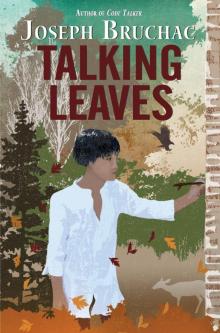 Talking Leaves
Talking Leaves Found
Found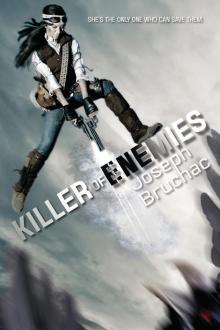 Killer of Enemies
Killer of Enemies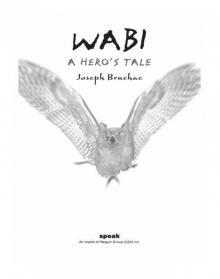 Wabi
Wabi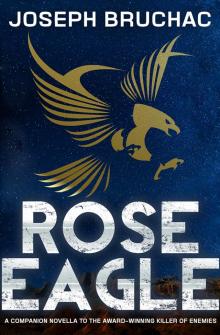 Rose Eagle
Rose Eagle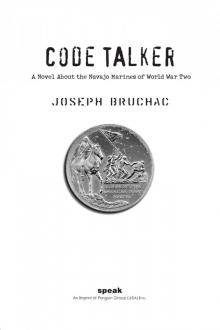 Code Talker
Code Talker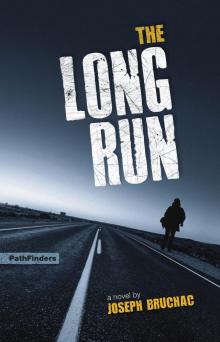 The Long Run
The Long Run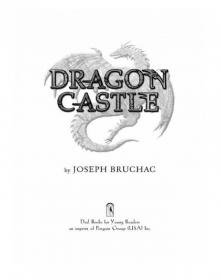 Dragon Castle
Dragon Castle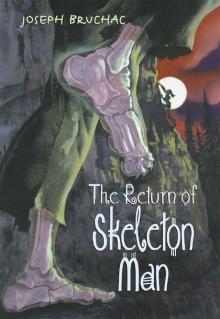 The Return of Skeleton Man
The Return of Skeleton Man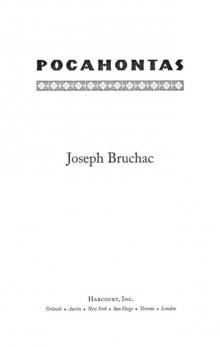 Pocahontas
Pocahontas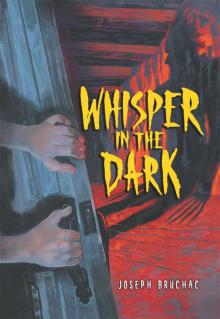 Whisper in the Dark
Whisper in the Dark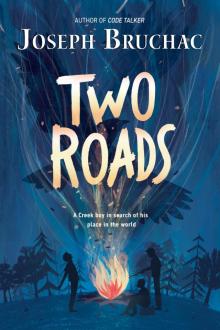 Two Roads
Two Roads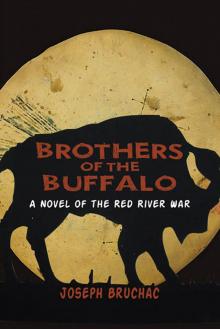 Brothers of the Buffalo
Brothers of the Buffalo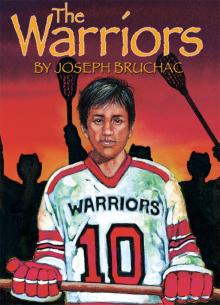 The Warriors
The Warriors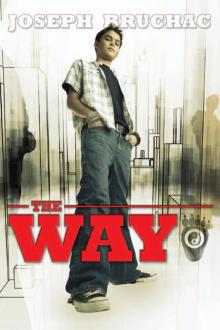 The Way
The Way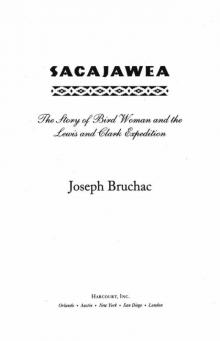 Sacajawea
Sacajawea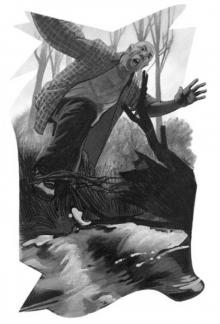 Night Wings
Night Wings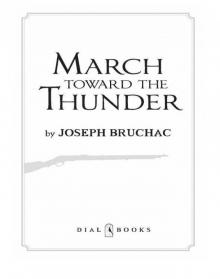 March Toward the Thunder
March Toward the Thunder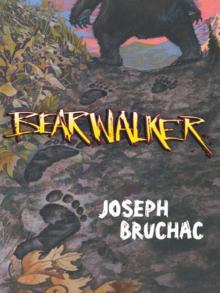 Bearwalker
Bearwalker Skeleton Man
Skeleton Man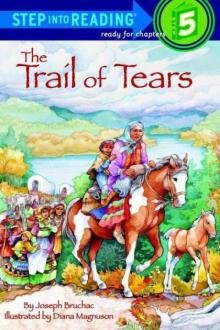 The Trail of Tears
The Trail of Tears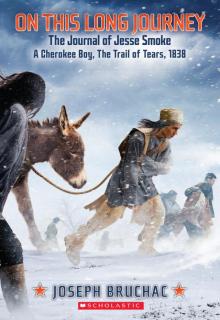 On This Long Journey
On This Long Journey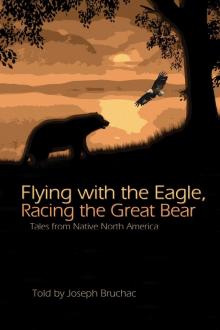 Flying with the Eagle, Racing the Great Bear
Flying with the Eagle, Racing the Great Bear